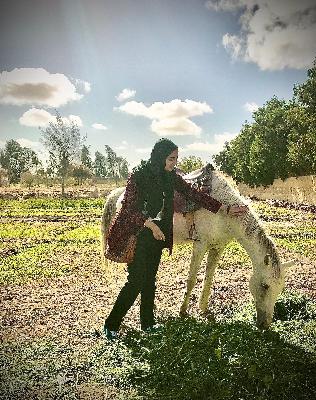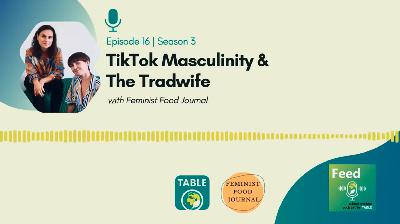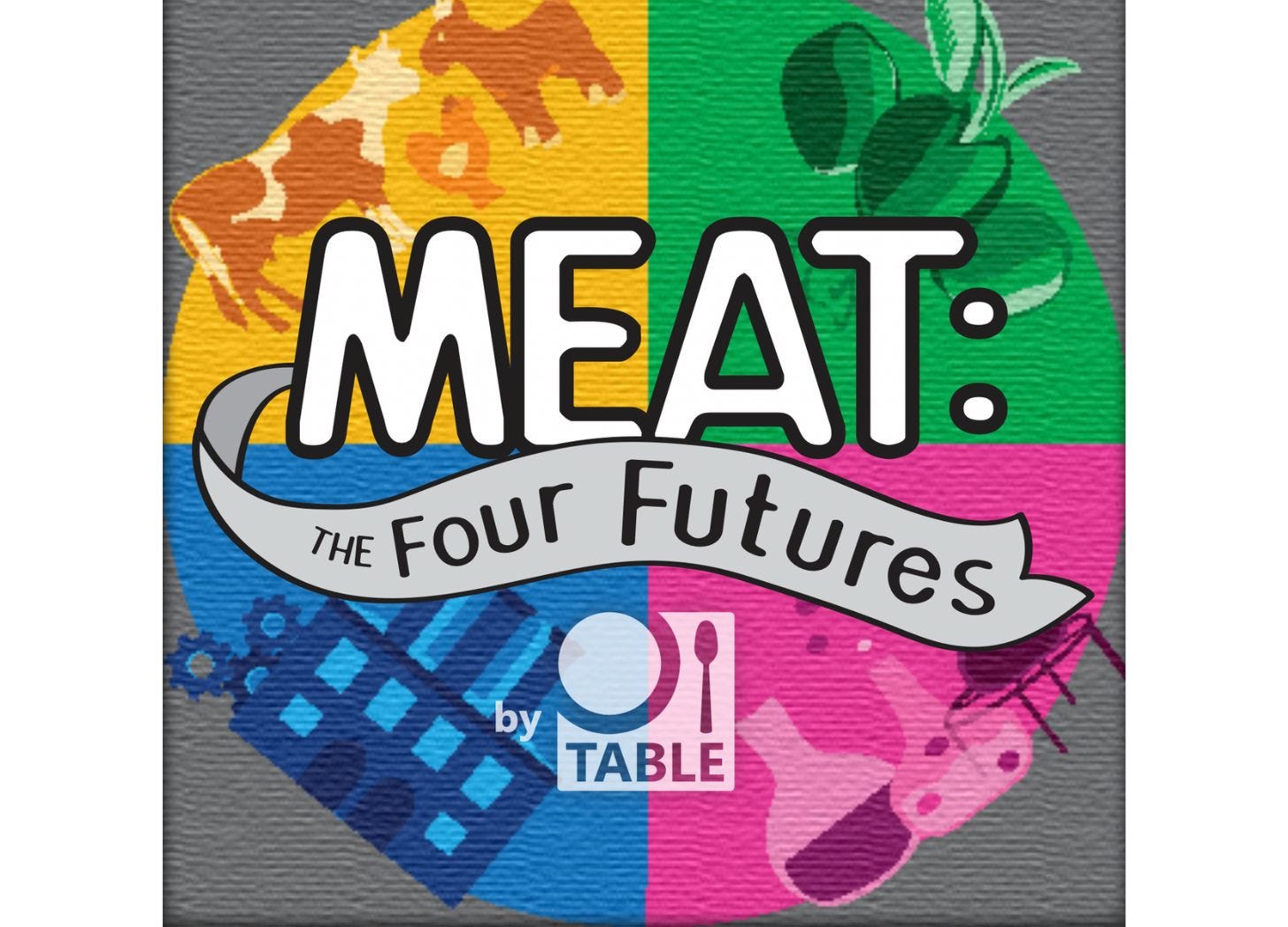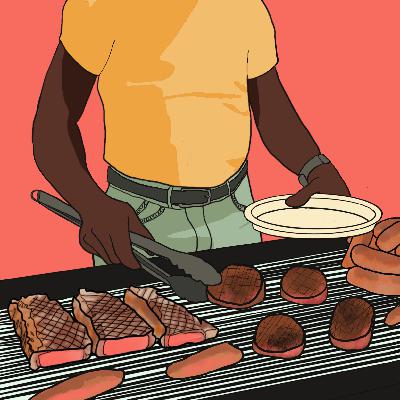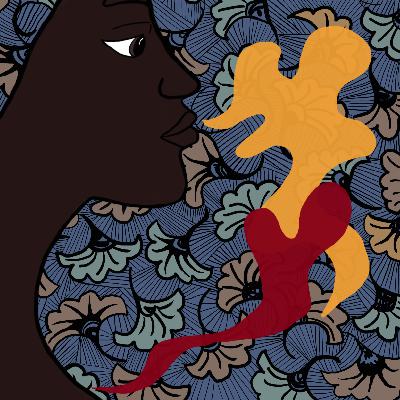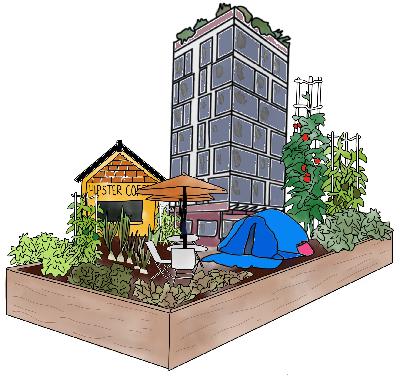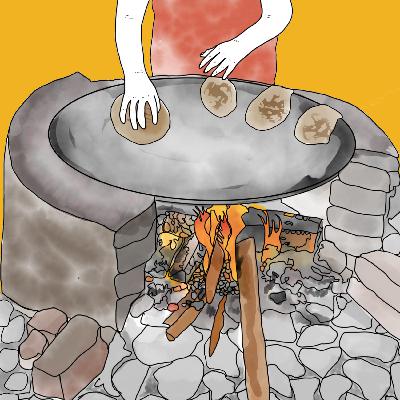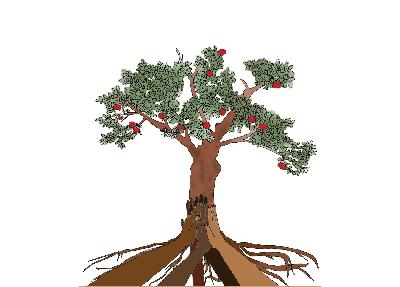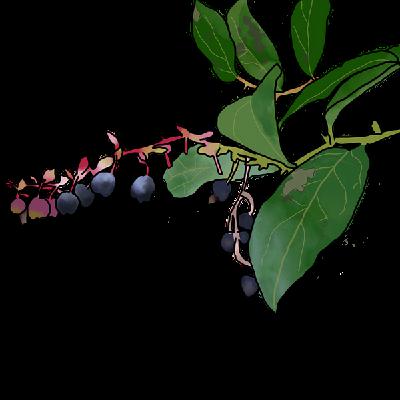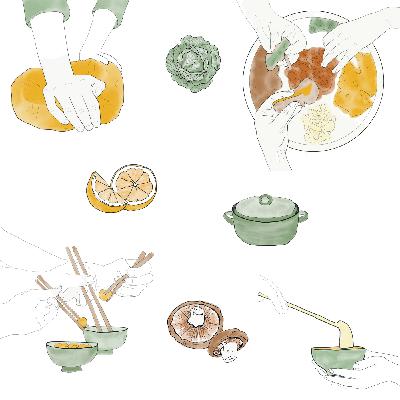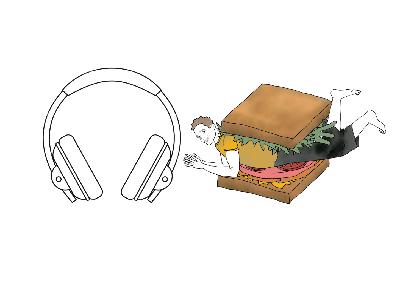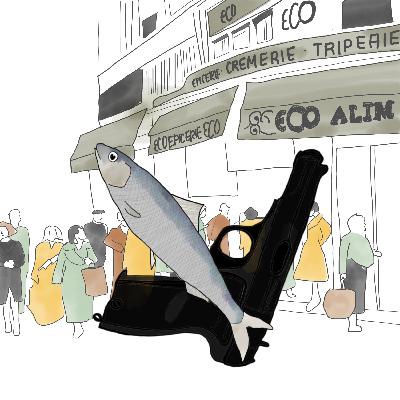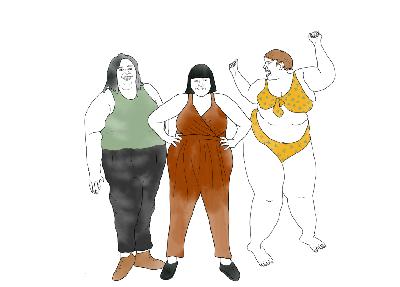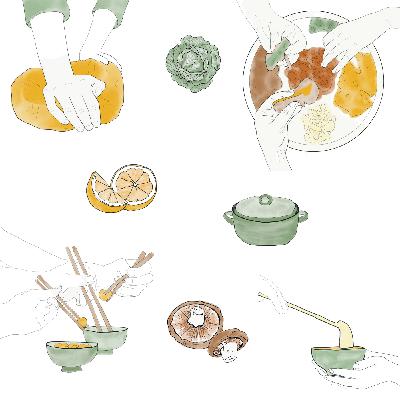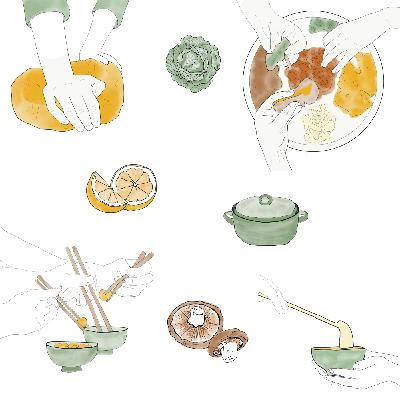Discover Feminist Food Stories
Feminist Food Stories

Feminist Food Stories
Author: Feminist Food Journal
Subscribed: 10Played: 101Subscribe
Share
© Feminist Food Journal
Description
Audio stories from Feminist Food Journal, an online magazine dedicated to a feminist food future.
www.feministfoodjournal.com
www.feministfoodjournal.com
19 Episodes
Reverse
Hi everyone — Isabela here with our second-last edition of this autumn’s SPOTLIGHT series. Today, we’re honoured to feature an audio interview with Lama Obeid, a Ramallah-based writer and reporter whose work focuses on culture, gastronomy, and food politics in the context of the ongoing Israeli occupation. This interview is a deep dive into themes from Lama’s work, which we covered in a short feature last May. Today, Lama and I discuss:* Palestinian food culture, particularly its emphasis on communal cooking and eating* The impact of the occupation on food sovereignty in Gaza and the West Bank* The sensitivities of reporting on food culture and heritage when people don’t have enough food to eat* The importance of recognizing Palestinian recipes as Palestinian* What food means to Lama’s identity as a Palestinian woman, and much more.A note on contextThis interview was recorded in late June of 2025. The situation on the ground in Gaza has continued to evolve, but the themes discussed here by Lama remain critical. Over the summer, the world bore witness to devastating levels of starvation architected by Israel, which UN Secretary-General António Guterres referred to as a “man-made disaster, a moral indictment — and a failure of humanity itself”. While a so-called ceasefire came into force on October 10, the violence has not stopped: Palestinian health authorities said 260 people had been killed since the ceasefire began. Bisan Owda, a journalist on the ground in Gaza, reports that Israel is only allowing “junk food” to enter Gaza, and that farmers remain barred from returning to the east and north areas of the strip, which constitutes nearly all of the territory’s fertile land. “A nation that is not independent in its food cannot be free,” she adds. This echoes many of the arguments made by Lama in today’s podcast.At the time of publishing, the UN Security Council has just voted to approve a US-backed Gaza peace plan, despite Israeli Prime Minister Benjamin Netanyahu continuing to insist that there can be no viable path to Palestinian statehood. Even if Palestine is slipping away from the headlines, it’s imperative to continue talking about it, and we’re so grateful that Lama took the time to do that with us. To stay up to date with her work, subscribe to her incredible newsletter, I Come From There, where she shares poetry, interviews, fiction, and some of her reporting. - Isabela SUPPORT FEMINIST FOOD JOURNALPremium subscriptions cost just $30 USD per year, and allow us to host writers like Lama on our podcast by covering our production costs! Please do consider supporting us if this is within your means. We recently launched our Feminist Food Friends collective, and premium subscribers can attend our events for free. We also offer premium subscribers audio readings done by writers themselves (not AI robot voices!) and exclusive resource round-ups. This is a public episode. If you'd like to discuss this with other subscribers or get access to bonus episodes, visit www.feministfoodjournal.com/subscribe
In January 2024, we sat down with hosts Jackie Turner and Matthew Kessler to record an episode for one of our favourite food podcasts, Feed by Table Debates. We’ve been fans of Feed since its inception — in the early days of FFJ, they were running a season on power in the food system — and to be hosted on our own episode was truly a dream come true. The episode was just released two weeks ago, and we’re syndicating it here as we know many of you will be interested in the topics we discussed.This Feed season focused on the overarching question: “should food systems be more natural?” In this episode, we wanted to explore the deeper questions around “natural” diets: whose labour makes them possible, who can afford them, and how culture and experience shape our food choices. We dive into these issues and uncover how a simple "natural foods" search on TikTok exposes striking gender dynamics.As host Jackie aptly notes in her introduction to the podcast, the political context around this discussion has changed significantly in the 13 months that have passed since recording. “Making America Healthy Again” by shifting towards more natural foods is now firmly on the U.S.’ political agenda, with RFK at the helm. Meanwhile, recent surveys show that the share of Republican men who believe that women should return to their “traditional roles” was at 48% in November 2024, up from 28% in May 2022 (among Republican women, this figure has similarly jumped from 23% to 37% ). What do these figures mean in the context of an unprecedented political interest in changing the ways that Americans eat? On whose backs are those in power expecting this shift to be built? The TikTok “Tradwife” (in essence, women who embrace and promote traditional gender roles) clips that Jackie shares with us in the episode give us some indication. In retrospect, they were a harbinger of the cultural shifts that were already churning in the last Biden year and for all of their aesthetically-pleasing serenity, offer a more dystopian vision of what (or who) will become the lifeblood of America’s “health”.As always, we’d love to hear what you think — and please subscribe to Feed if you haven’t already!Isabela and Zoë This is a public episode. If you'd like to discuss this with other subscribers or get access to bonus episodes, visit www.feministfoodjournal.com/subscribe
Can we square our love of animals with our inability to stop eating their body parts? In this short audio essay, Feminist Food Journal editor Isabela chronicles her evolving relationship with vegetarianism and stubborn love of offal to unpack what meat means to our sense of self.This podcast features writing and sound editing by Isabela Bonnevera and original music by the Electric Muffin Research Kitchen. This is a public episode. If you'd like to discuss this with other subscribers or get access to bonus episodes, visit www.feministfoodjournal.com/subscribe
This is an audio reading of Meat: The Four Futures, first published last week by TABLE researcher Tamsin Blaxter as part of our MEAT issue. Tamsin breaks down the gendered dimensions of different future visions on meat, weaving together strands of feminist and postcolonial history to examine why certain futures resonate differently with different folks, and what direction techno-meat is heading in. This is a public episode. If you'd like to discuss this with other subscribers or get access to bonus episodes, visit www.feministfoodjournal.com/subscribe
Through a conversation with his father, Amirio Freeman digs into the dynamics of grilling as a queer Black man. Drawing on references to literature investigating meat’s link to masculinity, the piece offers an intimate dialogue between family members about how the act of bringing meat to a flame reflects Black food traditions in need of stewards, impositions of gender performance, and food as a vehicle for queer possibilities. This is a public episode. If you'd like to discuss this with other subscribers or get access to bonus episodes, visit www.feministfoodjournal.com/subscribe
This is an audio version of the piece “To Speak in Two Tongues”, written (and narrated here) by Mwinji Nakamba Siame for our MEAT issue.Mwinji Nakamba Siame is a writer and budding visual artist with an interest in sharing and understanding African women’s experiences. Her nonfiction has most recently appeared in Art Dusseldorf where she wrote about the Women’s History Museum of Zambia. Her fiction is forthcoming in Chapbook format via Dancing Girl Press (US). This is a public episode. If you'd like to discuss this with other subscribers or get access to bonus episodes, visit www.feministfoodjournal.com/subscribe
A note from the editors: It is hard to believe that it was almost two years ago that we first published this powerful conversation with the feminist activists behind a virtual cooking class organized to raise funds for Feminist Workshop, an NGO based in Lviv, shortly after Russia invaded Ukraine. We’re not sure we would have believed you if you had told us then that the war in Ukraine would still be raging more than two years on. We also would not have wanted to believe you if you had told us just how much the scale of global conflicts would have grown in the last two years. We’ve thought about this conversation often as we’ve watched the horrors unfolding in Gaza over the last 150+ days. As one of our interviewees, Fenya, said:I’m walking around here in Brussels and in London and seeing everyone with little banners for “welcome Ukrainians”. But then when we have these ongoing crises in Afghanistan and we have the US and Western powers actively aggravating that. And people needing to leave and people being unsafe we don’t allow them in, we allow them to drown at sea. That doesn’t mean we shouldn’t support Ukrainians, but it means that we need to be a little more reflective on whose lives are worth saving. Although it can be painful to watch and observe how little has changed since early 2022, we believe, as Guardian columnist Arwa Mahdawi says, that bearing witness is a feminist act. Like in all conflicts, food has been central to this war: its weaponization by Israel, as it deliberately starves the population of Gaza to death, and its link to atrocities, as people waiting for aid were slaughtered in what is now grimly known as the “Flour Massacre”. We hope revisiting this podcast will offer you new insights into food, war, feminist organizing, and maybe provide a faint glimmer of hope — that for all the world’s violence, we can still find generative, creative ways of working together that don’t bolster the military machine.This podcast was written and produced by Zoë Johnson with original music by the Electric Muffin Research Kitchen. SHOWNOTESTranscriptRead the show transcript here.Resources* Learn more about Feminist Workshop and donate to their feminist and queer mutual aid in Lviv via GoFundMe;* Check the list of feminist, LGBTQI, disability justice groups in Ukraine and donate to them directly;* Read the Solidarity Statement and Call for Action; and* Follow Sonaksha Iyengar, who did the beautiful graphics for Cooking Up Resistance.Featured Audio Clips * Woman at war by Benedikt Erlingsson (2018): Ukrainian folk singers * Feminist Workshop: “Sex, Freedom, Money: What more do feminists want? (“СЕКС, СВОБОДА, ГРОШІ: ЧОГО ЩЕ ХОЧУТЬ ФЕМІНІСТКИ?”)* NPR’s Weekend Edition Saturday: “Ukrainian women are volunteering to fight, continuing a tradition” This is a public episode. If you'd like to discuss this with other subscribers or get access to bonus episodes, visit www.feministfoodjournal.com/subscribe
In this podcast, Troy Bright, a self-taught orca researcher, shares his knowledge of orcas’ rich matriarchal societies, their unique food cultures, and how our human food systems are putting this way of life at risk. This includes over-extraction of salmon, a key food source for orcas which Indigenous nations managed sustainably for thousands of years before colonization; Isabela dig into the links between the historical treatment of Indigenous women in the salmon canning industry and high levels of food insecurity among Indigenous and racialized women in British Colombia today. This is a public episode. If you'd like to discuss this with other subscribers or get access to bonus episodes, visit www.feministfoodjournal.com/subscribe
In this episode of Feminist Food Stories, Isabela sits down with Alison Hope Alkon, Associate Professor of Teaching in the Community Studies Program in the Department of Sociology at UCSC and co-editor of A Recipe for Gentrification: Food, Power, and Resistance in the City. Published in July 2020 by NYU Press and focused on large to mid-sized cities in Canada and the US, the edited volume explores the complex links between food, urban development, gentrification, and the right to the city.Isabela and Alison reflect on the book’s findings to discuss why we should include food in conversations about gentrification, and vice-versa; how to understand gentrification as an outcome of cultural or structural drivers; how well-intended activities like urban agriculture and food activism can inadvertently displace vulnerable communities, and how gentrification links to gender and racial justice.CreditsThis episode features research, writing, and sound editing by Isabela Vera and original music by the Electric Muffin Research Kitchen.Big thanks to all contributors to A Recipe for Gentrification, whose insights and analysis were instrumental in shaping this interview.TranscriptA full transcript of the episode is available online here.Further readingBooksCultivating Food Justice: Race, Class, and Sustainability. (2011). Edited by Alison Hope Alkon and Julian Agyeman.Urban Alchemy: Restoring Joy in America's Sorted-Out Cities (2013). Mindy Thompson Fullilove.JournalsAnguelovski, I. (2015). Alternative food provision conflicts in cities: Contesting food privilege, injustice, and whiteness in Jamaica Plain, Boston. Geoforum, 58, 184-194. https://doi.org/10.1016/j.geoforum.2014.10.014Anguelovski, I., Brand, A. L., Ranganathan, M., & Hyra, D. (2022). Decolonizing the Green City: From Environmental Privilege to Emancipatory Green Justice. Environmental Justice, 15(1), 1-11. https://doi.org/10.1089/env.2021.0014Bonotti, M., Barnhill, A. Food, Gentrification and Located Life Plans. Food ethics 7, 8 (2022). https://rdcu.be/dhzRR This is a public episode. If you'd like to discuss this with other subscribers or get access to bonus episodes, visit www.feministfoodjournal.com/subscribe
Esta es una versión en audio del artículo "Sin ellas no hay maíz ni país", escrito (y narrado aquí) por María Villalpando para nuestro número de TIERRA. You can also read and listen to the original English-language version.En México, el trabajo y conocimiento de las tortilleras, — mujeres que hacen y venden tortillas de manera tradicional — son fundamentales para conservar la agrobiodiversidad y las prácticas alimentarias tradicionales. Al reflexionar sobre el uso de la leña para la transformación de los alimentos en el campo mexicano, encontramos el particular vínculo entre las relaciones de género, la construcción de soberanía alimentaria y el uso de recursos energéticos para la transformación del maíz en alimento. Por María Villalpando | Traducido por Ignacio AhijadoMaría Villalpando es una estudiante de doctorado mexicana en la Universidad de California, Berkeley. María está interesada en las complejidades de los espacios rurales de México y entiende la escritura y la investigación como prácticas socialmente comprometidas.Ignacio Ahijado es traductor, mediador intercultural y gestor de comunicación en Nested CoLab. Actualmente vive en Lisboa, enclave atlántico desde donde busca construir puentes entre personas, culturas y territorios. This is a public episode. If you'd like to discuss this with other subscribers or get access to bonus episodes, visit www.feministfoodjournal.com/subscribe
In this episode, FFJ co-founding editor Zoë Johnson had the honour of speaking with Melanie Allen and amanda david about their work with the incredible Black Farmer Fund. They cover power in our food systems, the complexities of cultivating land in a capitalist settler-colonial context, and much more.CreditsThis episode features writing and sound editing by Zoë Johson; Research by Zoë Johnson & Isabela Vera; and original music by the Electric Muffin Research Kitchen.Audio clips include Dr. Alice Ragland, from her recording of “More Radical Than It May Seem” from Feminist Food Journal, and Karen Washington, from the video “Community Wealth Building” by Black Farmer Fund.TranscriptFull transcript of the podcast available here.ShownotesLearn more about Black Farmer Fund on their website, where you can also watch the powerful “Black Farmers Thriving” video series. For more information on investing, you can email invest@blackfarmerfund.com.Check out amanda david’s initiative, Rootwork Herbals and read about the Jane Minor BIPOC Community Medicine Garden.Further Readings“The Great Land Robbery” (Vann R. Newkirk II, The Atlantic)“Help Black Farmers, Who Know Hyperlocal Doesn’t Mean Fancy” (Tressie McMillan Cottom, The New York Times)“Race, Land, and the Law: Black Farmers and the Limits of a Politics of Recognition” (Brian Williams and Tyler McCreary, Black Food Matters: Racial Justice in the Wake of Food Justice)“The USDA Is Set To Give Black Farmers Debt Relief. They've Heard That One Before” (Emma Hurt, NPR) This is a public episode. If you'd like to discuss this with other subscribers or get access to bonus episodes, visit www.feministfoodjournal.com/subscribe
In this episode of Feminist Food Stories, editor Isabela sits down with Charlotte Coté, Professor in the Department of American Indian Studies at the University of Washington and author of A Drum in One Hand, A Sockeye in the Other: Stories of Indigenous Food Sovereignty from the Northwest Coast. They discuss the role of gender in Indigenous food sovereignty in both the past and present, the risks of “culinary imperialism” in blanket calls to veganize our diets, how social media enables Indigenous peoples to tell their own stories about food, and the ways that going back to the land with a “colonized” mindset can lead to missed opportunities for true connection.TranscriptFull transcript of the podcast available here.Shownotes and further resourcesCoté, C (2022). A Drum in One Hand, a Sockeye in the Other: Stories of Indigenous Food Sovereignty from the Northwest Coast. University of Washington Press. http://www.jstor.org/stable/j.ctv289dw4pCoté, C. (2022, Oct 17). ḥačatakma c̓awaak (everything is interconnected). Indigenous food sovereignty, health, resilience and sustainability. Talk given at President’s Dream Colloquium on Indigenous Peoples and Local Community Perspectives on Sustainability and Resilience. Simon Fraser University, Harbour Centre, Vancouver.Coté, C. (2022, Oct 6). “c̓uumaʕas. The River that Runs through Us”. Talk given at the Oregon Humanities Center, University of Oregon, Eugene, Oregon.Coté, C. (2022, Sep 28). UO Today interview: Charlotte Coté (Tseshaht First Nation), Amer. Indian Studies, University of Washington. University of Oregon.Coté, C. (2022, March 16). Exploring Indigenous Food Sovereignty with Dr. Charlotte Coté. MOHAI History Café. Download program transcript: https://adobe.ly/3PGcnPsCoté, C. (2022, March 3). Charlotte Coté with Dana Arviso: Stories of Indigenous Food Sovereignty from the NW Town Hall Seattle.Coté, C. (2019). hishuk’ish tsawalk—Everything is One: Revitalizing Place-Based Indigenous Food Systems through the Enactment of Food Sovereignty. Journal of Agriculture, Food Systems, and Community Development, 9(A), 37–48. https://doi.org/10.5304/jafscd.2019.09A.003Nast, C. (2020, November 8). This Inukj Throat Singer is Bringing Cultural Pride to TikTok. Vogue. https://www.vogue.com/article/shina-novalinga-indigenous-inuk-throat-singer-tiktok This is a public episode. If you'd like to discuss this with other subscribers or get access to bonus episodes, visit www.feministfoodjournal.com/subscribe
In an interesting twist, this is an in-house interview with FFJ’s founding editors. Isabela talks to Zoë about her master's thesis research on bunabéts, otherwise known as coffee houses, in Ethiopia and the links between serving coffee feminization and the sexualization of feminized labour. Zoë's research went on to be published in the Journal of Gender and Research. You can read it here.This podcast features writing, research, and sound editing by Isabela Vera and Zoë Johnson and original music from the Electric Muffin Research Kitchen. You can also listen to it on Apple Podcasts and Google Podcasts.Further reading* Bhopal, K. (2010). 'Gender, Identity and Experience: Researching Marginalised Groups.' Women's Studies International Forum, (33, 3: 188-195).* Campbell, R., & Wasco, S. M. (2000). 'Feminist Approaches to Social Science: Epistemological and Methodological Tenets.' American Journal of Community Psychology, (28, 6: 773-791).* Cornwall, A., & Anyidoho, N. A. (2010). 'Introduction: Women's Empowerment: Contentions and Contestations.' Development, (53, 2: 144-149).* Cornwall, A., Harrison, E., & Whitehead, A. (2008). 'Gender Myths and Feminist Fables: The Struggle for Interpretive Power in Gender and Development.' In A. Cornwall, E. Harrison, & A. Whitehead,(Eds: pp. 1-19 ). Gender Myths and Feminist Fables. Malden. MA: Blackwell Publishing.* Devault, M. L. (1990). 'Talking and Listening from Women's Standpoint: Feminist Strategies for Interviewing and Analysis.' Social Problems, (37, 1: 96-116).* Gregson, N., & Rose, G. (2000). 'Taking Butler Elsewhere: Performativities, Spatialities and Subjectivities.' Environment and Planning D: Society and Space, (18, 4: 433-452).* Hoppe, K. (1993). 'Whose Life Is It, Anyway?: Issues of Representation in Life Narrative Texts of African Women.' The International Journal of African Historical Studies, (26, 3: 623-636).* McRobbie, A. (2009). The Aftermath of Feminism: Gender, Culture and Social Change. London: SAGE.* Peacock, J. L., & Holland, D. C. (1993). 'The Narrated Self: Life Stories in Process.' Ethos, (21, 4: 367-383).* Shain, F. (2012). '"The Girl Effect": Exploring Narratives of Gendered Impacts and Opportunities in Neoliberal Development.' Sociological Research Online, (18, 2: 181-191).* van Stapele, N. (2014 March). 'Intersubjectivity, Self-Reflexivity and Agency: Narrating About "Self" and "Other" in Feminist Research.' Women's Studies International Forum, (43: 13-21). This is a public episode. If you'd like to discuss this with other subscribers or get access to bonus episodes, visit www.feministfoodjournal.com/subscribe
This is an audio reading of Just Because I Bottom, Doesn’t Mean I’ll Make You a Sandwich, narrated by Pericles Santis and written by Jay Gee for our SEX issue. Read the original article here.Further readingAtwood, S. F. (2019). The Determination of Gender Roles and Power Dynamics Within Female Same Sex Couples. University of Northern Iowa. https://scholarworks.uni.edu/cgi/viewcontent.cgi?article=1404&context=hpt Gill, R., and Orgad, S. (2018). The Shifting Terrain of Sex and Power: From ‘sexualization of culture’ to #MeToo. Sexualities, Vol. 2(8), 1313-1324. https://journals.sagepub.com/doi/abs/10.1177/1363460718794647?journalCode=sexa Milton, J. (2022, February 8). ‘The long, deep, surprisingly versatile history of bottoms: From Ancient Greece to modern misogyny’. Pink News. https://www.pinknews.co.uk/2022/02/08/bottoming-history-gay-bottoms/ Tarrant S. (2013). Men Speak Out: Views on Gender, Sex, and Power. Routledge. https://www.routledge.com/Men-Speak-Out-Views-on-Gender-Sex-and-Power/Tarrant/p/book/9780415521086Trotman, A.D. (2017). Relationship and Power Dynamics in Women’s Same Sex Abusive Couples. University of Rhode Island. https://digitalcommons.uri.edu/cgi/viewcontent.cgi?article=1619&context=oa_diss This is a public episode. If you'd like to discuss this with other subscribers or get access to bonus episodes, visit www.feministfoodjournal.com/subscribe
Paris, 1942. A group of women storm a grocery store on the Rue de Buci to seize the sardines on sale that day and distribute them to a hungry crowd. A scuffle ensues, shots ring out — and at the end, two policemen are dead. Today, the Rue de Buci event is remembered as an act of women’s resistance during wartime. But is that all there is to it?In this episode of Feminist Food Stories, founding editor Isabela sits down with Paula Schwarz, the Lois B. Watson Professor Emerita of French & Francophone Studies at Middlebury College and author of Today Sardines Are Not For Sale: A Street Protest in Occupied Paris, to discuss the intersections of wartime food politics and gender, and why and how resistance is remembered in different ways.This podcast features writing and research by Isabela Vera; sound editing by Isabela Bonnevera & Zoë Johnson, and original music by the Electric Muffin Research Kitchen. You can also listen to it on Apple Podcasts and Google Podcasts.SHOWNOTESTranscriptRead the show transcript here.Further readingBoyle, E. (n.d.). Wartime Memories: Louise Mardon. <https://www.eleanorboyle.com/wartime-memories/louise-mardon> Brown, T. (2022). The Breadwinners: The Women Whose Hunger Drove the French Revolution. Feminist Food Journal. Hunt, K. (2010). The Politics of Food and Women's Neighborhood Activism in First World War Britain. International Labor and Working-Class History, 77(1), 8-26. doi:10.1017/S0147547909990226Schwartz, P. (1999). The politics of food and gender in occupied Paris. Modern & Contemporary France, 7:1, 35-45, DOI: 10.1080/09639489908456468. Schwartz, P. (2020). Today Sardines Are Not For Sale: A Street Protest in Occupied Paris. Oxford University Press. (If you’re interested in reading it, you can order it using the discount code here!) This is a public episode. If you'd like to discuss this with other subscribers or get access to bonus episodes, visit www.feministfoodjournal.com/subscribe
Is there social, political, economic, and cultural war being waged on fat bodies? Scholars have argued that fat stigma is contributing to the social and physiological harm of fat people and that this stigma is in fact a central driver of morbidity and mortality at a population level. For FFJ’s second issue, WAR, our editor Zoë brings you another episode of Feminist Food Stories featuring her conversation with two scholars working at the intersection of food studies and fat studies. They discuss the war on “obesity”, its roots, its manifestations in the food movement, and their hopes for fat food justice in the future.This podcast features writing, research, and sound editing by Zoë Johnson and original music from the Electric Muffin Research Kitchen. You can also listen to it on Apple Podcasts and Google Podcasts.SHOWNOTESTranscriptRead the show transcript here.Further reading* Black Food Geographies: Race, Self-Reliance, and Food Access in Washington, D.C. (Ashanté M. Reese)* Belly of the Beast: The Politics of Anti-Fatness as Anti-Blackness (Da’Shaun L. Harrison)* “Can't Stomach It: How Michael Pollan et al. Made Me Want to Eat Cheetos” (Julie Guthman)* “The Fallacy of Eating The Way Your Great-Grandmother Ate” (Virginia Sole-Smith)* Fearing the Black Body: The Racial Origins of Fat Phobia (Sabrina Strings)* Freedom Farmers: Agricultural Resistance and the Black Freedom Movement (Monica White)* “It’s Not a Food Desert, It’s Food Apartheid” (Karen Washington)* Modern Food, Moral Food: Self-Control, Science, and the Rise of Modern American Eating in the Early Twentieth Century (Helen Zoe Veit)* “Public Health’s Power-Neutral, Fatphobic Obsession with ‘Food Deserts’”(Marquisele Mercedes)More activists and scholars to read, learn about, and follow:* Cat Pausé* Erica Zurawski* Lindley Ashline* Psyche Williams-Forson* Ragen Chastain This is a public episode. If you'd like to discuss this with other subscribers or get access to bonus episodes, visit www.feministfoodjournal.com/subscribe
Passover is upon us, and what better time to reflect on a Jewish mother's love for her children? Our MILK highlight of the week is editor Isabela's audio story, A Treasure for My Daughter, where she explores growth and sacrifice through the lens of her mom's non-kosher kitchen (and fluffy matzo balls). Dig in, eat on, and celebrate the eternal complexity that is food and family.This podcast features writing and research by Isabela Vera; sound editing by Isabela Vera & Zoë Johnson, and original music by the Electric Muffin Research Kitchen. You can also listen to it on Apple Podcasts and Google Podcasts.SHOWNOTESTranscriptRead the show transcript here. PhotosFor reference, here is my mom and I enjoying French delights on a trip to Paris that we took in March 2005, lieu of my having a bat mitzvah. Further readings This is a public episode. If you'd like to discuss this with other subscribers or get access to bonus episodes, visit www.feministfoodjournal.com/subscribe
This is the audio version of ‘The Childless Mothers’, a piece written by Lauren Gitlin for our MILK issue and read here by the author herself. Lauren is a former food scholar, journalist, and wine professional who currently owns and operates Villa Villekulla Farm, a goat microdairy in Barnard, Vermont. This is a public episode. If you'd like to discuss this with other subscribers or get access to bonus episodes, visit www.feministfoodjournal.com/subscribe
Milk is a highly contested beverage, but not always for the reasons you might think. In this episode of Feminist Food Stories (and as part of our MILK issue), editor Isabela looks at how milk is used as a tool of racial and gender oppression by both extremist alt-right forces and discreet government policies. For part of this story, she sits down with Alice Yao, an associate professor with the Department of Anthropology at the University of Chicago, to discuss Yao’s work on the links between milk consumption and Western imperialism.This podcast features writing and research by Isabela Vera; sound editing by Isabela Bonnevera & Zoë Johnson, and original music by the Electric Muffin Research Kitchen. You can also listen to it on Apple Podcasts and Google Podcasts.SHOWNOTESTranscriptRead the transcript of the show here.Further readingsFreeman, A. (2013). The Unbearable Whiteness of Milk: Food Oppression and the USDA. UC Irvine Law Review, Vol. 3, p. 1251, 2013. <https://ssrn.com/abstract=2338749>Stănescu, V. (2018). ‘White Power Milk’: Milk, Dietary Racism, and the ‘Alt-Right’, Animal Studies Journal, 7(2), 103-128. <https://ro.uow.edu.au/asj/vol7/iss2/7>The Economist. (2015, March 28). No use crying: The ability to digest milk may explain how Europe got rich. <https://www.economist.com/finance-and-economics/2015/03/28/no-use-crying> This is a public episode. If you'd like to discuss this with other subscribers or get access to bonus episodes, visit www.feministfoodjournal.com/subscribe


